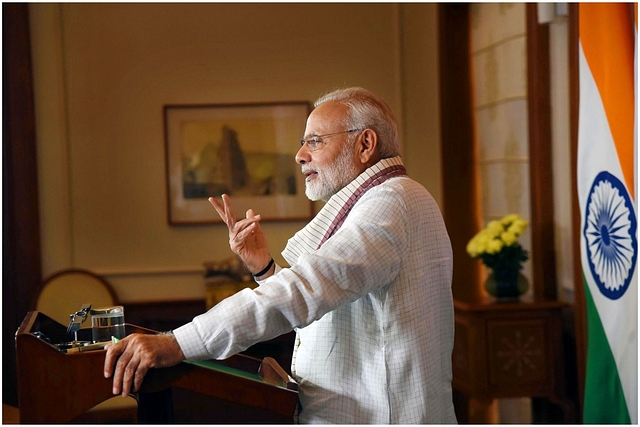
Modi 2.0 Gives A Renewed Vision For A New India
Modi 1.0 was about getting the basics right, Modi 2.0 is consolidating on the foundations laid in the first term.
This is a country whose people have preserved their culture even after long periods of rule by the invaders as well as by colonialist powers.
A people who, in Swami Vivekananda’s words, taught the world tolerance and universal acceptance. “We the People of India”, have strongly defended our civilisation, our values and have strived to take India from strength to strength against several odds.
At our pinnacle, we commanded everyone’s respect as the ‘Vishwa Guru’ and our fathers dreamt of restoring this great country back to that glorious past. However, the excitement of securing our freedom quickly dissipated. Gains and progress made was incremental, while failures and setbacks were colossal.
On the evening of the 26th May 2014, when Shri Narendra Modi took over as the 15th Prime Minister, the nation had en masse voted as if it were their last chance at correcting an era of wrongs.
Riding on the hope and aspirations of 1.3 billion citizens, the government worked towards increasing the poor’s access to bank accounts, house hold toilets, clean cooking fuel and electricity connections.
The spectacular gains of the governments’ socio-economic agenda ran parallel to the efforts in securing the national security agenda. India under the Modi government was no longer held ransom by our adversaries. The surgical strikes and the Balakot airstrikes defined a new normal. Budgetary spending on defence procurements such as the Rafale jets and Apache helicopters further enhanced our defence capabilities.
In a nutshell, Modi 1.0 was about getting the basics right - securing social justice and economic wellbeing for our people, providing the tools to boost the economy as well as empowering our forces to respond to acts of aggression.
Therefore, it was not surprising when the electorate overwhelmingly endorsed the BJP in the 2019 Lok Sabha elections. Modi 1.0 was about solving basic issues, Modi 2.0 is consolidating on the foundations laid in the first term. This work started right from day one on May 31st, when the government took oath.
For starters, the recently concluded parliament session was one of the most productive of all time with many significant bills being passed.
The first signature of the Hon’ble Prime Minister was on a file that aimed at enhancing scholarships for the children of our defence personnel. This shows our commitment towards the welfare of those who protect our borders.
The government understands the need for unshackling our investigating agencies so that they can conduct free, fair and impartial inquiries.
The Unlawful Activities Prevention Act (UAPA) now provides for the designation of ‘individuals’ as terrorists. To ensure that there is no misuse of such a provision, Hon’ble Home Minister Amit Shah has ensured that there is a mechanism in place to ensure that the principles of natural justice are adhered to.
The National Investigative Agency (NIA) Bill that was passed in the aftermath of the ghastly 26/11 Mumbai Terror Attack is a classic case of “Cessante Ratione Legis, Cessat Ipsa Lex” - “Cessation of the rationale behind a law, results in the cessation of the law itself.”
Therefore, nearly a decade after the original act was enacted, an amendment to expand the scope of the NIA was brought in.
The NIA can now also prosecute offences committed outside the territory of India. These offences include human trafficking, counterfeit currency or bank notes, manufacture or sale of prohibited arms, cyber - terrorism and offences enumerated under the Explosive Substances Act, 1908. This law will deliver on our promise of zero tolerance towards terrorism and extremism.
The abrogation of Article 370, which was a temporary provision in our constitution, has always been a core issue in the BJP manifesto. The abrogation of Article 370 was necessary to achieve complete integration of Jammu and Kashmir into mainstream India.
When Dr. Ambedkar, as India’s Law Minister and Chairman of the Drafting Committee of the constitution, was asked by Sheikh Abdullah to draft the special status provision, he responded:
You want India to defend Kashmir, feed its people, give Kashmiris equal rights all over India. But you want to deny India and Indians all rights in Kashmir. I am Law Minister of India. I cannot be a party to such a betrayal of national interests.
Article 370 was anti-women as daughters of J&K marrying outside the state lost their property rights. It was anti-Dalit and anti-tribal as it deprived equal opportunities to these vulnerable groups.
Valmikis in the state of J&K were forced to remain as sanitation workers as they were denied permanent residency.
Article 370 perpetuated homophobia as the Ranbir Penal Code followed in Jammu & Kashmir had been left untouched even though Section 377 of the Indian Penal Code was struck down by the Supreme Court.
As a result of Article 370, the right to education was not a fundamental right in Kashmir. Several important acts such as the Prevention of Child Marriage Act could not be applied to the state of J&K.
Further, the creation of Ladakh as a separate Union Territory has been a long-standing demand that will further propel the aspirations of the people of that region.
Modi 2.0 strives to achieve social good for its people while adhering to well laid out conventions and constitutional principles. Through our mantra of Minimum Government and Maximum Governance, we would be truly achieving a government of the people, by the people and for the people.
(G Kishan Reddy is the Minister of State for Home Affairs and represents Secunderabad Lok Sabha constituency)